Platform
Use Cases
Many Possibilities. One Platform.
AI and Automation
The Always-on Incrementality Platform
Solutions
Teams
Built for your whole team.
Industries
Trusted by all verticals.
Mediums
Measure any type of ad spend
Use Cases
Many Possibilities. One Platform.
AI and Automation
The Always-on Incrementality Platform
Teams
Built for your whole team.
Industries
Trusted by all verticals.
Mediums
Measure any type of ad spend
Prepare to be Confused

That opt-in popup is a thorn in the mobile advertising industry. Asking Users if they want to be tracked is probably the most sarcastic way to ask permission to do anything.
It’s like a fast food restaurant actively asking their customers if they allow “Unhealthy food” whenever they make an order.
To add insult to injury - Apps are only allowed to ask users once, they cannot limit app functionality if the user does not allow tracking, and are not allowed to incentivize users to opt in.
Opt In rates are estimated to be around 50% - but what 50% means to the mobile advertising industry is FAR WORSE.
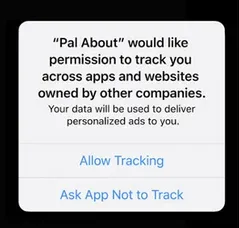
In this example, we have 10 users, 3 publishers and 1 Advertiser.
From first look, it seems that since all 3 publishers and the Advertiser have an opt in rate of 60% - those 60% will share IDFAs amongst one another, allowing Advertisers to track and attribute conversions using IDFA matching.
But that’s NOT how the Opt In mechanism attribution works.
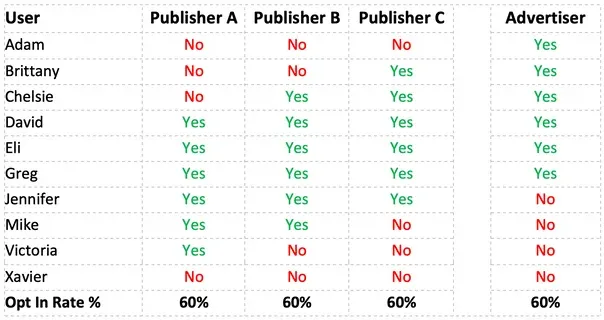
Both Publisher and Advertiser must request permission for tracking, making the factored opt in rate, lower:
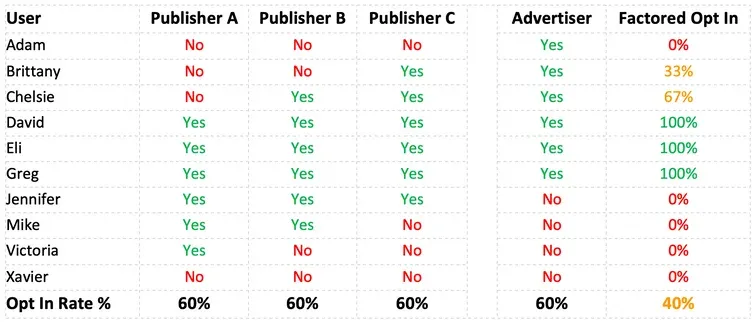
For attribution to happen using identifiers, users need to engage with ads on the apps they allowed tracking. Making the Factored opt in get another factoring based on the app where the users saw and clicked an ad for the advertiser…
In the example below, the publishers where the users clicked an ad (and installed the app) is marked in Pink
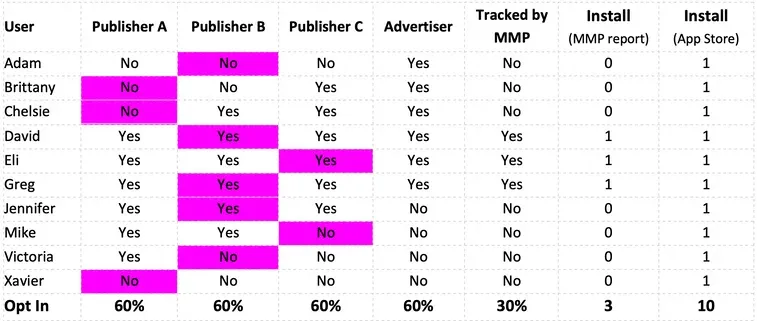
To sum it up -
Your attribution provider will have tracked 3 installs out of the 10 actual installs that happened.
SKAdnetwork will report all 10 installs in aggregate form to the networks.
AdNetworks will receive a total of 13 Postacks - the 10 from SKAdnetwork and another 3 from your MMP.
None of the parties involved has a way to deduplicate the postbacks.
And to give you another caveat - Apple Search Ads gets attributed by a different API and not through SKAdnetwork - i.e. another set of attribution with no ability to deduplicate.
Confused yet ?
As consumers - we love “2 for 1”, but as Marketers trying to get accurate reporting for optimization, we rely on the data to be accurate.
The Mat(c)h problem creates a potential big problem for Advertisers.
Check out the diagram below:
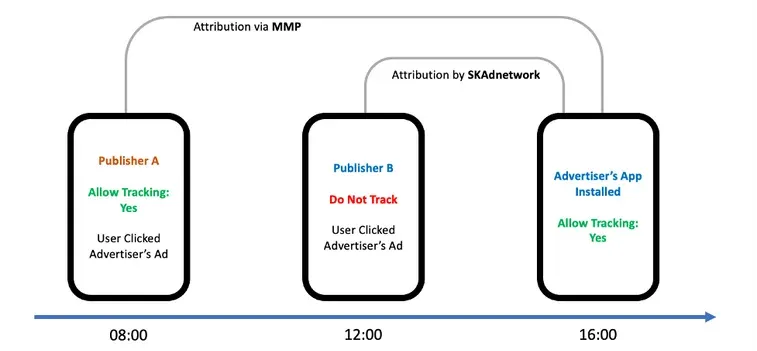
Advertiser received 1 Install.
SKAdnetwork will track 1 install, and attribute this to Publisher B.
MMP will track 1 install for Publisher A, and if the MMP is also handling SKAdnetwork postbacks - the MMP will display on reports both the install they tracked, as well as the install tracked by SKAdnetwork.
The MMP has no way to deduplicate the 2nd postback or know which one was the last touch point before the user converted.
Oh - and remember - SKAdnetwork won’t send a postback for a single install, as posting a single install defeats the purpose of a privacy first attribution solution…
Attribution and Tracking in a Post IDFA changes the paradigm we’ve been used to.
Currently, developers are accepting solutions proposed without realizing that there is no solution other than accepting the change and reconfiguring how tracking, attribution, and measurement is done.
Special thanks to Thomas Petit, Shamanth M. Rao, and Eric Seufert for helping us write this article.
INCRMNTAL offers an incrementality platform, allowing Advertisers to unlock the value of their marketing spend. The platform requires no SDK or code for onboarding, and provides incrementality and cannibalization insights for marketers to maximize their ROAS.
Incrementality, is the only True Attribution.
If you want to learn more, book a demo today!